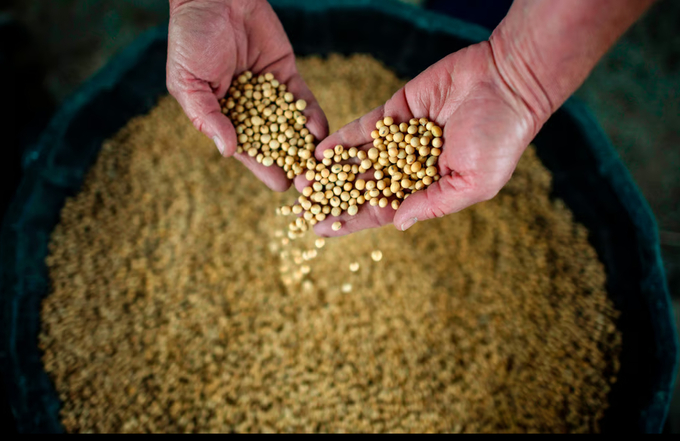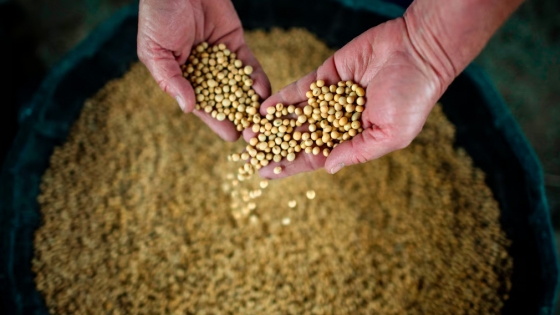(VAN) ‘Agricultural products are an important part of bilateral trade between China and the US,’ AmCham Shanghai says.

Soybeans are harvested in Nebraska. Photo: AFP.
Agricultural firms from the US reported signing major deals at the world’s largest trade fair in Shanghai, and they said exports of soybeans and sorghum to China would maintain their growth momentum even after a White House power transfer in January.
A total of 31 American companies signed deals worth US$711 million with Chinese buyers during the six-day China International Import Expo (CIIE), up 41 per cent from a year earlier, according to the American Chamber of Commerce in Shanghai.
“Agricultural products are an important part of bilateral trade between China and the US. We hope both governments will actively explore new paths to bolster the economic ties,” AmCham Shanghai president Eric Zheng said on Sunday. “We expect the two economies to keep playing complementary roles to each other [in the trading of agricultural products].”
Zheng said business discussions between the delegation, the CIIE and Chinese buyers will continue over the next year, which will likely yield larger transactions.
Last year, the American agricultural delegation, led by the US Department of Agriculture (USDA) and AmCham Shanghai, signed deals worth US$505 million at the CIIE, and they secured another US$3 billion in purchase orders from mainland buyers over the subsequent 12 months, Zheng said.
It is the second time that the USDA and AmCham Shanghai co-hosted a pavilion that showed off produce and technology from California, Idaho and Georgia.
The increase in business at the CIIE is a bright spot in the economic relationship between Beijing and Washington, despite worries that a trade war will escalate when Donald Trump begins his second term as US president. On the campaign trail, he said he was considering tariffs of 60 per cent or more on Chinese goods, far higher than duties of 7.5 per cent to 25 per cent applied during his first term, which ended in 2021.
“China badly needs American agricultural produce such as soybeans, which was deemed high-quality and low-priced even after the tariffs,” said Chen Xiao, CEO of Shanghai Yacheng Culture, a provider of marketing and branding services to multinational food companies. “American farms also see China as their key market to bolster sales. This is a win-win scenario and trade of the products are likely to be stable.”
American agricultural produce is now subject to a 25 per cent tariff that became effective in 2018 in retaliation to duties imposed by the Trump administration. China is the largest market for American farm goods and its biggest client for soybeans.
The value of US agricultural exports to China in 2023 slumped 24 per cent from a year earlier to US$29.1 billion. Soybeans, corn, cotton and sorghum saw the largest losses in the period.
For its part, the CIIE seeks to convince China’s trade partners of Beijing’s commitment to free trade and expanding access to its market. Foreign businesses see it as an opportunity to build relations with China’s central and local governments, as well as corporate and individual buyers.
Deals worth US$80 billion were signed this year at the expo, an increase of 2 per cent from a year earlier, according to the organiser – the CIIE Bureau – which is a unit of the Ministry of Commerce.
This year’s event drew 3,500 exhibitors from more than 150 countries and regions, including major multinational firms from carmaker Volkswagen Group to cosmetics brand L’Oreal.
“The CIIE has consistently proven to be a platform for showcasing global innovations and fostering business collaborations,” said Wayne Shi, president of French pharmaceutical company Sanofi’s Greater China operations. “Its spillover effect is particularly noteworthy, as it is driving growth in the healthcare industry, among many other sectors, by accelerating the introduction of innovative products into the Chinese market.”
Agriculture News | Agri Products Price



